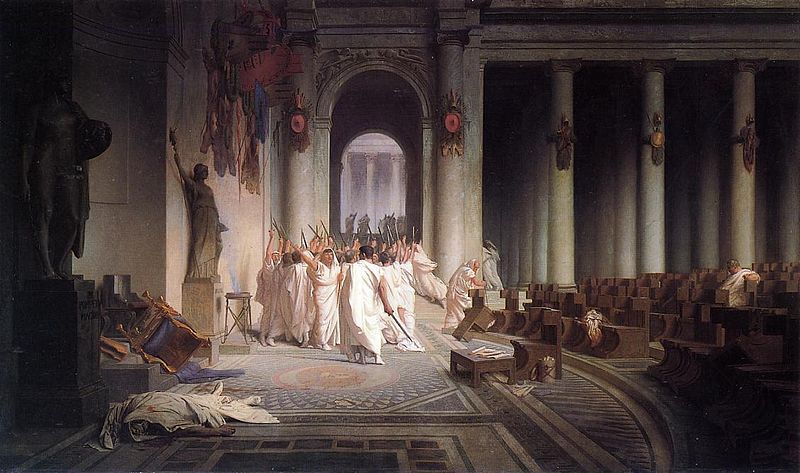
Today is Remembrance Day here in the UK. I haven't got a special Remembrance Day post this year, but I wanted to mark it in some way, so here are links to two of my older posts appropriate to the day: Joyeux Noel and A Matter of Life and Death (both brilliant films and highly recommended if you're looking for something appropriate to watch tonight).
Today's post, however,
I had hoped to leave behind the question of what Caesar may or may not actually have said as he was dying after my post of Shakespeare’s Julius Caesar, but it sparked a bit of debate in the comments, so I thought I’d better address it again here, briefly. I had made an offhand comment (probably in an ill-advised attempt to be amusing) wondering why Suetonius says Caesar’s last words were in Greek. Caesar, as an educated Roman, certainly spoke and read Greek. However, he was raised in Italy, spent much of his career in Gaul, worked with Italian soldiers and wrote exclusively in Latin, so I don’t think that Greek, for him, was like English for a Welsh speaker or something – personally, I don’t think it’s a language he would just have spontaneously come out with. I think that if Suetonius is telling the truth (I’m ignoring Dio Cassius for the moment, or we’d be here all day), then Caesar was quoting something, possibly a lost work of Greek literature. What that means, of course, is that we have no way of knowing what significance Suetonius expected us to attach to the phrase, because we don’t know if we were expected to recognize the quotation or not. The Greek phrase is just three words, ‘and you, child?’ and whether it should be interpreted as a reproach, as a reference to biological paternity, as a curse or warning as some have suggested, or some other meaning that would be revealed if only we knew the source, is pretty much impossible to say.
It is also worth mentioning that Suetonius has quite a thing for famous last words. This is the same biographer who gave us ‘Have I played my part well enough?’ (Augustus), ‘What an artist dies with me!’ (Nero), ‘Dear me! I seem to be turning into a god’ (Vespasian) and, indirectly, ‘I have only one regret’ (Titus). I think the chances of all these people having such memorable last words and Suetonius correctly recording all of them, decades later, are, let’s face it, fairly slim.
Anyway, that’s quite enough of that, this isn’t supposed to be a history seminar! The point of going over all this again is that one of the best aspects of this book is the way Massie deals with the murder itself. Although the sources are pretty clear that whatever the phrase was, it was addressed to Marcus Brutus, Massie, knowing his readers will be half-expecting the Shakespearian ‘et tu, Brute?’ transfers the phrase to the other Brutus involved in the conspiracy, his narrator, Decimus Brutus. He also adjusts the phrase to make its meaning clear, as his Caesar says ‘Not you, my son.’ I don’t think he means to suggest that Decimus is Caesar’s biological son (though he does relate an affair between Caesar and Decimus’ mother, but after Decimus’ birth) but the reproach and the idea that Caesar gives up when he realises that one of his closest friends, stipulated as Octavian’s guardian in his will, is involved in the plot to murder him, is pretty clear. This is a brilliant move on Massie’s part, as it combines the emotional sucker punch of the guilt and betrayal of the narrator with a different twist on a very well known scene.

Unfortunately, not everything worked so well for me. Decimus Brutus is an interesting choice of narrator, and you can see the appeal in using him, as Caesar’s close ally and one of his murderers. We don’t actually see much of their friendship though, as the early part of the book races from the Rubicon to Pharsalus to Egypt and back to Rome as quickly as humanly possible. Having read some of Tiberius, I was expecting an I, Claudius-style imperial biography, but this is really just the story of the murder plot, not the story of Caesar’s life (which, to be fair, the back cover would have told me if I’d read it properly!). I also found it disconcerting that it was very unclear who the narrator was for several pages, and if you weren’t very familiar with Shakespeare or with the ancient sources, Decimus Brutus, not one of the more famous assassins, would mean nothing and you’d have to read the dramatis personae (not something I usually do before starting a novel) to find out who he was and why he’s narrating this. It seems to me that a novel should be equally enjoyable for people who lots about the subject and for people who know nothing about it, and I’m not sure that this is.
I wasn’t wild about the characterization of Decimus either, who came across as quite spectacularly whiny (he constantly complains that Caesar stole his thunder for the first half, and constantly complains that Cassius won’t take any of his advice for the second). He also has an improbable amount of sex with very famous people (in the first few chapters he gets through Clodia, Cleopatra and Octavius and refers to an old affair with Clodius) in between arguments about politics, so the novel becomes, essentially, a history lesson with intermittent bouts of sex. And we have the usual pop culture Roman stereotypes, with Casca (portrayed as early twentieth century camp, he keeps calling people ‘old fruit’) having his slave-boys give him a blow job while discussing politics with Decimus. Hardly anyone behaves like that now, though in our culture we are, if anything, more sexually liberated than the Romans, so why are we so collectively convinced that Romans had no social or personal boundaries?
Cassius’ characterization is largely taken from Shakespeare, and towards the end of the book, Massie starts lifting whole chunks from Shakespeare. Cassius hold a dinner party in which he persuades his fellow conspirators to murder Caesar, and gives Cassius’ speech from Julius Caesar. It’s been edited and rendered into modern English, but it is, essentially, the same speech with the same examples, and includes the line ‘the fault does not lie in the stars. It lies rather in ourselves.’ Brutus, on the other hand, is very different. Decimus-as-narrator refers to him derogatively as ‘Markie’ throughout, but since Massie does not actually show us why Brutus is so annoying and useless, but rather just tells us over and over again, all this did was increase my dislike for Decimus (who also refers to Calpurnia as a ‘bitch’ several times, which seems ridiculously over-harsh for someone who’s just a bit over-wrought and has an unpleasant air of sexism to it, which pretty much sealed my dislike of him. Calpurnia herself is more reminiscent of Joan Sims in Carry on Cleo than anything else). Brutus is made responsible for insisting on leaving Antony alive, and his mistakes in the conspiracy itself are explained, but why Decimus dislikes him so much in the first place is less clear.
The book was written in 1993 and seems to draw on certain themes from 1980s Britain, with arguments about the conflict between individualism and society, and when Decimus says he has heard Caesar ‘deny the very existence of society’ the novel seems to be drawing a deliberate parallel with Margaret Thatcher and Thatcherism in general. This is, however, somewhat underwritten by a later conversation in which Caesar expresses concern about the quality of milk in the city and Decimus complains that Caesar is busying himself with milk supplies for the poor while others debate philosophy. The choice of milk as an example can’t be a coincidence, and perhaps this conversation is intended to make the reader feel for Caesar and feel antagonistic towards Decimus, but in the context of a first-person narration, I’m not sure it works – it just makes it seem like the author hasn’t quite decided what his take on things is.
That’s probably quite enough whining from me! (Though, one last thing – right at the end Decimus goes past a place he calls ‘Little St Bernard’ which took me right out of the story – I don’t know what it’s Roman name was, but it certainly didn’t have ‘St’ in it in 44 BC). The scenes surrounding the murder itself are very well done, as is the description of the night before the murder, which is nicely tense. And despite his odd slang, Casca is a likeable character, I felt sad when he
 died. Overall, unfortunately, I was disappointed, though judging from the enthusiastic quotes on the cover, others have enjoyed the book very much, so I guess it’s just not my cup of tea. I still have Tiberius hanging around so hopefully I’ll enjoy that one a bit more!
died. Overall, unfortunately, I was disappointed, though judging from the enthusiastic quotes on the cover, others have enjoyed the book very much, so I guess it’s just not my cup of tea. I still have Tiberius hanging around so hopefully I’ll enjoy that one a bit more!This seemed as good an excuse as any to throw in a picture of a cute St Bernard! Though I'm really more of a cat person myself.
Milk? Did the Romans even drink milk? I don't think so. That's going too far to draw parallels. And trying to portray Caesar as a Thatcherite is just weird.
ReplyDeleteMarcus Brutus is so hard to get a handle on. given the sources we have he is a bundle of contradictions and yet so smooth he's almost not there. On the one hand, he seems like an ivory tower idealist, believing that everyone would be glad that Caesar was dead, yet he was just as much a political schemer as everyone else in his class. Pompey killed his father and he avoided Pompey like the plague, but he rushed to Pompey's side in the Civil War, because Pompey was more important to Rome than Brutus' feud with him. That last bit makes me think of Carrot - Personal isn't important - and there is a sort of overgrown boy scout aspect to Brutus, though I rather doubt the two of them would have got along. Bibulus' biography of Brutus, who was is step-father, is near the top of my list of lost works I'd like to have turn up.
There appears to have been a temple of Jupiter at a mansio at the top of the Little St. Bernard Pass, but I can't seem to find the Latin name of it.
They probably drank goats' milk, but it did seem like a parallel too far.
ReplyDeleteCould be worse. I once read a "historical" fiction book that made Brutus not only the same age as Caesar but had him growing up with in Caesar's household almost as a brother. The first book in the series covered the Sulla-Marius conflict is a terribly inaccurate manner. I gave up after the first book.
ReplyDeleteThat's true - this book is thoroughly researched and very accurrate when it comes to anything checkable - it's all the random sex that seems unlikely
ReplyDelete